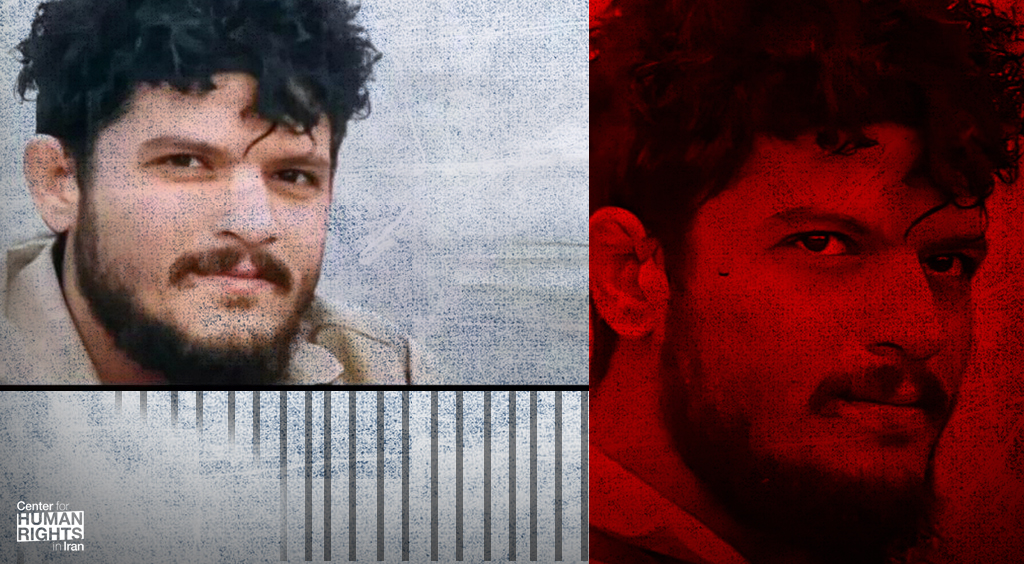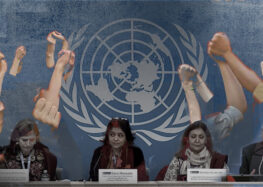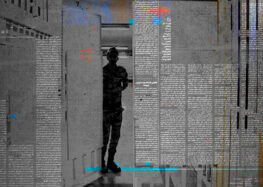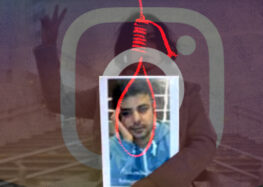Tortured Street Protester in Iran Faces Years of Imprisonment Without Due Process
 Case Reflects Severe Rights Violations Faced by Ethnic Minorities in Iran
Case Reflects Severe Rights Violations Faced by Ethnic Minorities in Iran
“For a long time after his release, [due to the torture] he forgot his own name”
February 19, 2023 – There are grave concerns for Farshad Dastmardi, a 32-year-old welder and boxer and member of the Lur ethnic minority in Iran, who is facing years of imprisonment in Iran after suffering severe injuries and being profoundly traumatized by the torture and inhumane treatment he endured while in state custody.
The Center for Human Rights in Iran (CHRI) condemns the egregious violations of Dastmardi’s rights, whose only “crime” was engaging in peaceful protest against the state, and denounces the 3.7-year prison sentence imposed on him without Dastmardi having a lawyer or any ability to present a defense in court.
CHRI notes that the crimes committed against Dastmardi are typical not only of the way the Islamic Republic treats all those who engage in peaceful protest, but also the particularly brutal way the state violates the most fundamental rights of minority communities, committing violence against them in the streets, in the detention centers, and in the courts with impunity.
- CHRI calls upon the judicial authorities in Iran to immediately annul the prison sentence imposed on Dastmardi, due to the evidence of torture, which is forbidden under Iranian law, and the blatant violations of due process during his legal proceedings.
- CHRI urges the UN and world leaders to condemn the continued unlawful prosecution of protesters in Iran, and the particularly harsh state retribution that is reserved for members of Iran’s minority communities.
- CHRI asks that the UN’s Fact-Finding Mission (FFM) on Iran, established to investigate the Islamic Republic’s killing of more than 500 men and women participating in the protests that erupted across Iran in September 2022 and other atrocities connected to the protests, investigate Dastmardi’s case and his torture by the Islamic Revolutionary Guard Corps’ (IRGC) intelligence organization.
Tortured by Revolutionary Guard Intelligence Agents
“One day before the court hearing, judicial officials called the family and said Farshad was with them and he was fine and they could come to his trial,” said the source who spoke on the condition of anonymity for security reasons.
“When Farshad’s family saw him after this long time, his face was badly bruised, and his hands were bandaged,” added the source. “He had been tortured so much that his hands and feet still go numb sometimes.”
Dastmardi, a member of the Lur ethnic minority group in the Iranian city of Dehdasht, in Kohgiluyeh and Boyer Ahmad province, is now deeply scarred, physically and psychologically, after being twice detained and tortured in connection with protests in support of Iran’s peaceful “Woman, Life, Freedom” uprising, a source with detailed knowledge of his case told CHRI.
After protests erupted across Iran in 2022, triggered by the killing in state custody of Mahsa Jina Amini, 22, days after her arrest for alleged hijab violations, the lethal violence employed by state forces to suppress the protests was particularly severe in cities inhabited by ethnic minorities, such as Dehdasht, where Dastmardi resides.
Dastmardi’s case epitomizes the systemic injustice and state violence endured by members of minority communities in Iran. Ethnic minorities are disproportionately targeted for lethal state violence, subjected to blatant judicial violations that routinely include torture, and are also disproportionally executed after sham trials.
His family’s economic hardship, typical amongst minority communities who also face deep economic discrimination, compounds their suffering, leaving them unable to afford legal representation to mount a defense or appeal his sentence.
First Arrest: Tortured by IRGC Intelligence Agents
Dastmardi was initially arrested amid anti-state protests in October 2022, held for months, then re-arrested in September 2023.
“In [October 2022]. Farshad was at the home of one of his relatives when the agents stormed the house and arrested him,” a source told CHRI.
“At first, they took Farshad to the Special Forces Barracks. Two rows of soldiers and officers stood with batons and threw him to the ground and beat him so much that he was on the verge of losing consciousness. That’s when he suffered a serious head injury. After a few hours, Farshad was transferred to the detention center of the Islamic Revolutionary Guard Corps (IRGC) Intelligence Organization.”
According to the source, Dastmardi was not given any food for about five days and despite the severity of the injuries caused by torture, no treatment or care was provided. He developed amnesia, and for a long time after his release, he forgot his own name, said the source who added this was also due to drugs that were given to him in the IRGC detention center in the city of Yasouj. Dastmardi does not know what drugs were given to him.
Destmardi was later transferred to the Yasouj Central Prison and charged with “leading the criminal gang.” In late January 2023, after nearly four months in detention, he was released on bail set at approximately $50,000.
Second Arrest: Held Incommunicado for 100 Days, Then Sentenced to Prison After Two-Day Trial with No Lawyer
As the anniversary of nationwide protests approached, state security agents increased pressure on Dastmardi and his family to prevent him in engaging in further peaceful dissent by joining more protests that were anticipated around that time.
His family was pressured to deliver Dastmardi to prison to ensure he did not join protests; that’s when Dastmardi, fearing for his life and safety, fled the city.
The source with extensive knowledge of his case told CHRI: “One month before the anniversary of the protests in Dehdasht, Mr. Bagheri, the head of the Ministry of Intelligence office, went to Farshad’s father and said Farshad should report himself to prison and stay there until after the anniversary of the protests. He told Farshad’s father that he had been closely monitoring Farshad’s movements and activities for the past month and claimed that during this time Farshad was instigating people to cause chaos in the city on the anniversary of the protests. That’s when Farshad ran away and left the city.”
Meanwhile, a week before the memorial for Pedram Azarnoush, a 16-year-old protester killed by Islamic Republic forces in Dehdasht in September 2022, security agents went to Dastmardi’s home and put a gun to his mother’s head and demanded that he report to prison, said the source.
On September 22, 2023, at a memorial for Pedram Azarnoush (who was killed at age 16 by state forces in 2022 in the village of Dareh Labak, near Dehdasht, security forces attacked the attendees and arrested several people. It was during this crackdown that Dastmardi was located and re-arrested.
A source close to Dastmardi said: “The following day, around 6 a.m., security forces went to Farshad’s hideout in his family’s village and arrested him after beating him up. Farshad’s family had no news of him for more than a hundred days. They didn’t even know which agency had arrested him or where he was being held.”
Dastmardi was held incommunicado until early February 2024, when his family was suddenly told the location of his trial, during which he did not have a lawyer and had no time or ability to prepare a defense.
Without the presence of his lawyer, Dastmardi was tried on several charges, including inciting people to engage in war and murder with the intention of disrupting national security. The rapid court proceedings were in complete violation of judicial regulations.
The source close to Dastmardi told CHRI: “Farshad was released from prison in very bad physical and mental condition and just two days later, a court verdict was delivered to his family stating he had been sentenced to prison “for propaganda against the Islamic Republic with the intention of disturbing public opinion and national security.”
According to the verdict, a copy of which was obtained by CHRI, Dastmardi was sentenced to three years and seven months in prison based on reports submitted by the IRGC’s intelligence organization, screenshots of his social media posts and so-called “confessions in court.”
Yet Dastmardi was not given a chance to speak during the trial and made no confession, the source told CHRI.
Now confronting additional charges and potential incarceration, the specifics of Dastmardi’s case remain undisclosed to his family, who harbors grave concerns about his well-being, particularly if he is subjected to imprisonment.
Dastmardi is currently home trying to recover from his injuries sustained in state custody yet could be taken to prison at any moment to serve his sentence.
Read this report in Persian
This report was made possible from donations by readers like you. Help us continue our mission by making a tax-deductible donation






